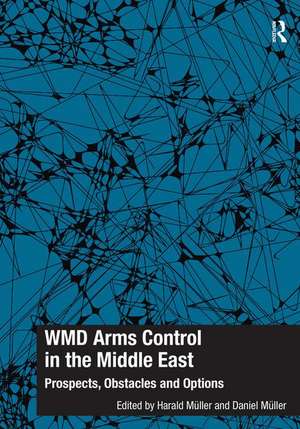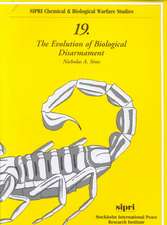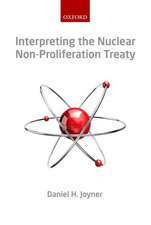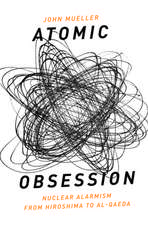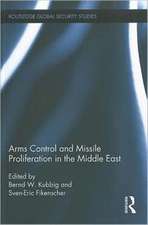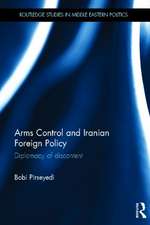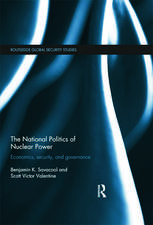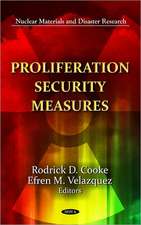WMD Arms Control in the Middle East: Prospects, Obstacles and Options: The Ashgate Plus Series in International Relations and Politics
Autor Harald Mülleren Limba Engleză Hardback – 13 feb 2015
Preț: 770.81 lei
Preț vechi: 1106.65 lei
-30% Nou
Puncte Express: 1156
Preț estimativ în valută:
147.50€ • 154.39$ • 122.76£
147.50€ • 154.39$ • 122.76£
Carte tipărită la comandă
Livrare economică 31 martie-14 aprilie
Preluare comenzi: 021 569.72.76
Specificații
ISBN-13: 9781472435934
ISBN-10: 1472435931
Pagini: 358
Dimensiuni: 174 x 246 x 29 mm
Greutate: 0.82 kg
Ediția:New ed
Editura: Taylor & Francis
Colecția Routledge
Seria The Ashgate Plus Series in International Relations and Politics
Locul publicării:Oxford, United Kingdom
ISBN-10: 1472435931
Pagini: 358
Dimensiuni: 174 x 246 x 29 mm
Greutate: 0.82 kg
Ediția:New ed
Editura: Taylor & Francis
Colecția Routledge
Seria The Ashgate Plus Series in International Relations and Politics
Locul publicării:Oxford, United Kingdom
Recenzii
’A Middle East free of nuclear, and other weapons of mass destruction, has been discussed for nearly forty long years without fruition. This impressive volume by stellar contributors provides valuable insights into the politics and modalities not only for policy makers, but also for every reader interested in peace in the region.’ Tariq Rauf, Stockholm International Peace Research Institute, Sweden ’Urgent action is needed to rid the Middle East of nuclear, chemical, and biological weapons, but the obstacles to constructive action are formidable. Müller and Müller have assembled the most authoritative, diverse, and creative set of ideas available for overcoming these obstacles. Anyone who is interested in gaining a better understanding of the requirements for peace and stability in the Middle East should read this book.’ Martin B. Malin, Harvard University, USA
Notă biografică
Harald Müller is Executive Director of the Peace Research Institute Frankfurt (PRIF), which is a member of the Leibniz Association, and Professor of International Relations at Goethe University, Frankfurt. He has been a member of the German delegation to the NPT Review Conferences, served as a member of the UN Secretary General’s Advisory Board on Disarmament Matters and was a member of the IAEA Expert Group on Multilateral Fuel Cycle Arrangements. Since 2010, he is Vice-President of the EU Non-Proliferation Consortium. Daniel Müller is a Research Associate at the Peace Research Institute Frankfurt (PRIF) and a PhD student at Frankfurt University. He is focusing on WMD arms control in the Middle East and on the foreign and security policies of Egypt, Syria and Jordan.
Cuprins
Introduction, Harald Müller, Daniel Müller; Part 1 Setting the Stage; Chapter 1 The Regional Security Environment and Basic Principles for the Relations of the Members of the Zone, Nabil Fahmy; Chapter 2 The Main Elements of a WMD-free Zone in the Middle East, Mohamed I. Shaker; Chapter 3 Assessing the Relevance of Nuclear CBMs to a WMD Arms Control Process in the Middle East Today, Emily B. Landau; Chapter 4 The Iran Nuclear Dilemma: The Peaceful Use of Nuclear Energy and the NPT’s Main Objectives, Seyed Hossein Mousavian; Chapter 5 Basic Principles for a Process Leading to the Establishment of a Middle East Free of Weapons of Mass Destruction, Harald Müller; Part 2 Arms Control Approaches in the Middle East: Taking Stock; Chapter 6 A Zone Free of WMD and Means of Delivery in the Middle East: The Multilateral Diplomatic Process, 1974–2010, Benjamin Hautecouverture, Raphaëlle Mathiot; Chapter 7 Status of Non-proliferation Treaties, Agreements, and Other Related Instruments in the Middle East, David Santoro; Chapter 8 The Arms Control and Regional Security Working Group: Still Relevant to the Middle East?, Peter Jones; Part 3 Assessing Regional Capabilities, Challenges and Opportunities; Nuclear Matters; Chapter 9 Nuclear Capabilities in the Middle East, Mark Fitzpatrick; Chapter 10 Peaceful Uses of Nuclear Energy in the Middle East: Multilateral Nuclear Approaches, Giorgio Franceschini; Chapter 11 A Middle East Regional Arrangement on Securing Radiological Agents as a CSBM: A Common Interest in Preventing Radiological Terrorism, Nilsu Gören, Aviv Melamud; Chapter 12 Promoting Nuclear Safety and Nuclear Security in the Middle East Region, Mark Fitzpatrick; Chemical and Biological Matters; Chapter 13 Biological and Chemical Weapons and the Prospective Disarmament Process in the Middle East, Jean Pascal Zanders; Chapter 14 Building Confidence towards a MEWMDFZ via a Chemical Weapons Ban, Dina Esfandiary; Chapter 15 Building Confidence over Biological Matters in the Middle East, Una Becker-Jakob; Chapter 16 Towards WMDFZ in the Middle East: Biological Confidence-building Measures, David Friedman; Conventional Weapons, Missiles, and Other Means of Delivery; Chapter 17 Conventional Strategic Military Capabilities in the Middle East, Pieter D. Wezeman; Chapter 18 The Dynamics of Missile Proliferation in the Middle East and North Africa, Stéphane Delory; Chapter 19 Missiles and Other Means of Delivery in the Middle East, Uzi Rubin; Chapter 20 The Issue of ‘Delivery Systems’ in a Middle East Zone Free of Weapons of Mass Destruction, Trezza Carlo; Chapter 21 A Middle East Free of Missiles and Weapons of Mass Destruction: An Iranian View, Nasser Hadian, Shani Hormozi; Chapter 22 Coping with Military Asymmetries in the Middle East: A Framework for Missile-related Confidence- and Security-building Measures, Bernd W. Kubbig; Part 4 Arms Control and regional Security Matters; Chapter 23 The Middle East Regional Security Regime and CSBMs, Shlomo Brom; Chapter 24 Arms Control in Times of Transition — Egypt, Daniel Müller; Chapter 25 Making Peace Attractive: Emphasizing the Benefits of a Negotiated Agreement between Israel and the Palestinians, Claudia Baumgart-Ochse; Chapter 26 The Regional Security Architecture and Other Confidence-building Measures, Peter Jones; Part 5 In Lieu of Conclusion; Chapter 27 Some Reflections on Confidence-building Measures in the Middle East, Sinan Ülgen; Chapter 28 A Middle East Zone Free of Weapons of Mass Destruction — (Still) a Topic for a Helsinki Meeting?, Hans Blix; Chapter 29 Tiptoe, Stride and Leap: Steps Towards a WMD-free Middle East, Patricia M. Lewis; Chapter 30 A Weapons of Mass Destruction-free Zone in the Middle East: An Incremental Approach, Harald Müller, Claudia Baumgart-Ochse;
Descriere
The Middle East is a hot spot of proliferation and it is the world region that witnessed the most frequent and severe employment of chemical weapons since the end of World War I. Notwithstanding, not a single arms control regime concerning weapons of mass destruction (WMD) covers the region as a whole. This volume, written under the auspices of the EU Consortium for Non-Proliferation and Disarmament, determines the current state of diplomatic efforts to establish a WMD free zone in the Middle East. In doing so, it provides insights into central actors’ conflicting political positions, thereby explaining the stalemate of efforts to negotiate a WMD-free zone.
